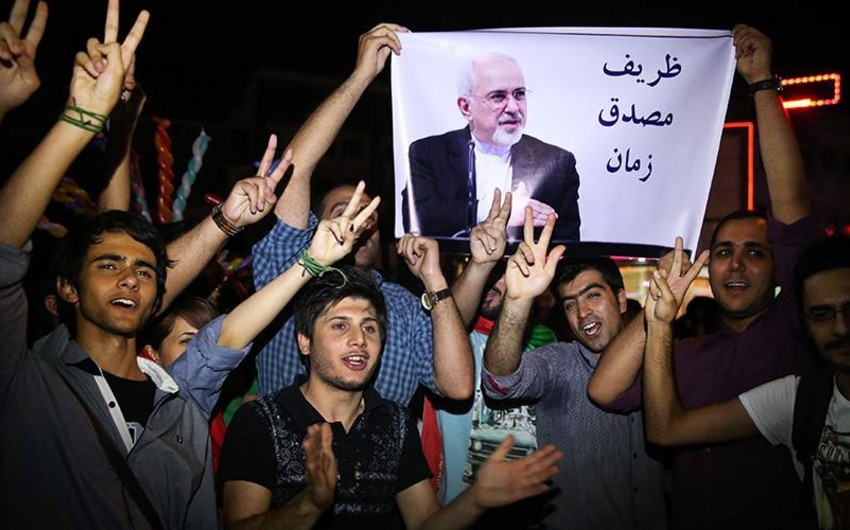Baku. 28 February. REPORT.AZ/ Iran's nuclear program has created many problems for the government. Recent developments show that the attitude of the upper echelons towards Iran’s nuclear program and cooperation with the West and the United States is unequivocal. It is no accident that many civil servants, scientists, specialists in government or nuclear technology have either been killed in unclear circumstances or fled Iran, resigned or were dismissed. And these processes can be clearly seen on the example of the Iranian Foreign Ministry, because it is a foreign minister who contacts directly with the countries of the ‘Six’, which means he learns about any winds of resentment blowing from the West firsthand.
On February 25, Iranian Foreign Minister Mohammad Javad Zarif said he was stepping down apologizing to people for all the shortcomings in the past years during his time as foreign minister. On February 26, Iranian President Hassan Rouhani did not accept his resignation. Then why did Mohammad Javad Zarif want to resign? Why was his resignation not accepted? He said in his interview with Iranian media that he had resigned to protect the reputation and authority of the : "As a minister, I had to give up the function of the foreign policy department for the sake of the national interests and the state.” According to him, the fight between parties and political groups in Iran is a "deadly poison" in the formation of foreign policy: "First of all, our foreign policy must not be a subject of confrontation between parties and political groups."
The Minister pointed out the negotiations with the West representatives stressing that he was under pressure from of the internal conservative line of power. They repeatedly criticized Hassan Rouhani and Mohammad Javad Zarif for the Comprehensive Agreement between Iran and the "six" in 2015. Last year, after US President Donald Trump re-imposed sanctions against Iran, they were subjected to more pressure and criticism in that direction. Thus, the minister stated that he was resigning because the foreign policy department has been disrespected and its political course became a subject of political interference, as well as pressure on him and ungrounded critical remarks
They accuse Zarif of being "gentle" with the West. After his resignation, some Iranian ambassadors in foreign countries were said to take a similar step. Hassan Rouhani's refusal to accept the minister's resignation helped to avoid a great diplomatic scandal. Generally, Zarif - Soleimani confrontation is the struggle between the power lines, problems in the power division, the incompetence of the Cabinet of Ministers headed by the president, and other similar problems, such as cracks in foreign policy. The foreign minister’s resignation was not accepted to cover the shortcomings. However, this does not mean that he will remain in his post. Maybe the authorities would dismiss Mohammad Javad Zarif after some time. Even, a criminal case can also be filed against him in the future. Historical events prove that the Iranian authorities can find a reason for it. Mohammad Javad Zarif was born in 1960.
He has held various significant diplomatic and cabinet posts since the 1990s. Zarif is also a visiting professor at the School of International Relations and University of Tehran, teaching diplomacy and international organizations. He was the Permanent Representative of Iran to the United Nations from 2002 to 2007. During his tenure as a foreign minister, he led the Iranian negotiation with P5+1 countries which produced the Joint Comprehensive Plan of Action on 14 July 2015, lifting the economic sanctions against Iran on 16 January 2016. At that time Zarif was like a hero in Iran.
By the way, Iran's disrespect to the Foreign Minister is not the first incident in the past nine years of diplomacy. At the end of 2010, Manuçehr Muttaki was dismissed from office while on a business trip in Senegal. Then the ex-minister evaluated the event as follows: "Stepping down on a foreign trip is a contemptible, abusive step contrary to the political and diplomatic etiquette. I have heard from Senegal officials while negotiating that I was dismissed. The president knew beforehand that my visit would last for four days, at least in two countries. Stop these unethical behaviors! This style of behavior will neither be honor for our system, nor for its leaders and it does not correspond to dear Iranian people".
Chief advisor to Muttaki was treated in the same way. This begs a question: Is there a need for a Cabinet of Ministers in Iran? Who rules Iran: Khamenei, Revolutionary Guard Corps or the Cabinet of Ministers of Hasan Rouhani? This issue gives us grounds to argue that there is double, or even triple government in Iran. If the reformers in this country do not look back to the power division, Iran will lose confidence in the international arena. Iran has Qawam al Saltana experience. Ahmed Gawam, who was prime minister of Iran during the Shah period, once deceived Stalin. His agreement with the then Soviet leader was ignored by the Iranian parliament. This means that the documents signed by the President of Iran, Foreign Minister and other members of the Government can be abolished at any time. The resignation letter of the minister and its rejection once again revealed the tensions and problems in the Iranian government.
The reason why Tehran and the West fail to negotiate is the problem of division of powers among the country's rulers.
In other words, who should West negotiate with in Iran?


 https://static.report.az/photo/776b8f5c-a73b-45d7-a28e-f2958a669d20.jpg
https://static.report.az/photo/776b8f5c-a73b-45d7-a28e-f2958a669d20.jpg

